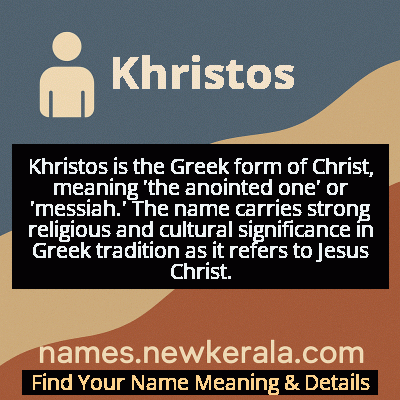Khristos Name Meaning & Details
Origin, Popularity, Numerology Analysis & Name Meaning of Khristos
Discover the origin, meaning, and cultural significance of the name KHRISTOS. Delve into its historical roots and explore the lasting impact it has had on communities and traditions.
Name
Khristos
Gender
Male
Origin
Greek
Lucky Number
2
Meaning of the Name - Khristos
Khristos is the Greek form of Christ, meaning 'the anointed one' or 'messiah.' The name carries strong religious and cultural significance in Greek tradition as it refers to Jesus Christ.
Khristos - Complete Numerology Analysis
Your Numerology Number
Based on Pythagorean Numerology System
Ruling Planet
Moon
Positive Nature
Diplomatic, friendly, artistic, empathetic.
Negative Traits
Over-sensitive, moody, indecisive, prone to self-pity.
Lucky Colours
Green, cream, white.
Lucky Days
Monday.
Lucky Stones
Pearl, moonstone.
Harmony Numbers
1, 3, 4.
Best Suited Professions
Diplomats, mediators, caregivers, artists.
What People Like About You
Cooperative spirit, friendliness, artistic talent.
Famous People Named Khristos
Khristos Sartzetakis
Politician/Jurist
President of Greece from 1985-1990, known for his integrity during the Greek junta period
Khristos Giannopoulos
Basketball Player
Professional Greek basketball player who has played for Panathinaikos and the Greek national team
Khristos Tsigkanos
Actor
Greek television and film actor known for roles in popular Greek series and films
Khristos Dantis
Singer/Composer
Popular Greek singer and composer with multiple platinum albums and Eurovision participation
Name Variations & International Equivalents
Click on blue names to explore their detailed meanings. Gray names with will be available soon.
Cultural & Historical Significance
The cultural impact extends beyond religious contexts into art, literature, and philosophy, where the concept of 'Khristos' has influenced Greek thought for nearly two millennia. Byzantine art prominently featured Christ figures, and the name became intertwined with Greek national identity during the Ottoman period as a symbol of cultural resistance. In modern Greece, the name remains a powerful symbol of faith and cultural continuity, connecting contemporary Greek identity with its Byzantine and early Christian heritage. The name's usage in religious ceremonies, family traditions, and cultural celebrations reinforces its enduring significance in Greek society.
Extended Personality Analysis
Individuals named Khristos are often perceived as having strong leadership qualities, moral integrity, and a natural inclination toward helping others. They tend to be charismatic figures who inspire trust and respect in their communities. Many Khristos-named individuals exhibit a balanced combination of traditional values and modern thinking, often serving as bridges between generations or different social groups. Their personality is frequently characterized by a sense of responsibility, compassion, and a desire to make positive contributions to society.
These traits may stem from the name's association with spiritual leadership and service. Khristos-named people often demonstrate resilience in facing challenges and maintain a calm, thoughtful demeanor even in difficult situations. They typically value family, community, and cultural traditions while being open to progressive ideas and innovation. The name's strong cultural associations often lead bearers to develop a keen sense of ethics and social responsibility, making them natural mediators and community leaders who prioritize collective well-being over individual ambition.
Modern Usage & Popularity
In contemporary Greece, Khristos remains a popular and respected male name, though its usage has evolved from exclusively religious contexts to broader cultural acceptance. While still carrying strong Christian connotations, many modern parents choose the name for its traditional roots and cultural significance rather than purely religious reasons. The name maintains steady popularity in Greece and among Greek diaspora communities worldwide, particularly in the United States, Australia, and Germany where Greek communities preserve naming traditions. In recent decades, there has been a slight decline in its frequency as parents explore more diverse naming options, but it continues to rank among the top traditional Greek male names. The spelling 'Christos' is more common in everyday usage, while 'Khristos' often appears in formal or religious contexts. The name is particularly prevalent in regions with strong Orthodox traditions and remains a favorite for boys born around Christmas or Easter, maintaining its connection to religious celebrations.
Symbolic & Spiritual Meanings
Symbolically, Khristos represents divine anointing, spiritual leadership, and redemption across multiple dimensions. The name embodies concepts of sacrifice, salvation, and moral guidance that transcend its religious origins. In metaphorical terms, it signifies someone who brings light, hope, or transformation to challenging situations, often serving as a moral compass within their community or family. The symbolic weight includes associations with healing, wisdom, and the bridging of human and divine realms, making it a name that carries expectations of high moral character and service-oriented leadership. In cultural contexts, Khristos often symbolizes traditional values, ethical conduct, and community service, representing the ideal of selfless contribution to society. The name carries connotations of resilience and the ability to overcome adversity through faith and principle, making it a powerful symbolic choice that influences how bearers are perceived in their social and professional circles throughout their lives.

